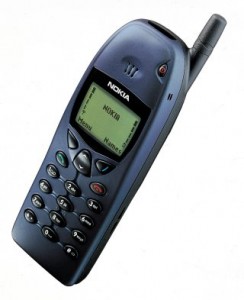Amusingly perhaps, my topic of choice this week is mobiles, how ubiquitous they have become and how we deal with their interruptions. I decided this on Friday. On Tuesday morning, it was announced that Microsoft would be buying nokia’s devices and services. I never expected to be blogging about mobiles and my love of nokia on the week its death sentence was pronounced. But there you go. Serendipitous irony.
Ah, i still remember my first nokia. A green confection, with an antenna sticking out and a black back. A bit like the one in the photo. The battery popped out, and was a good 1-2cm thick. Probably weighed a goodly 300gr. No sms functionality (they didn’t exist in 1997). Just calls. And voicemail.
I. Hate. Voicemail.

I. Hate. Voicemail. Detest it. Most people would argue that it discourages interruptions, diverts them to this voice box for you. And you only have to look in there when you have the time. Well. I dare all those people to be 18, have a mother who leaves 10 messages in the first hour of university lectures ending, asking when i’m coming home. Why? She worried. Why didn’t i pick up? I was talking to classmates or studying (we had an awesome library at McGill). There was no rush to go home.
But my mailbox was full and i was supposed to pay 50c to call a number, listen to message after message, potentially take notes on paper, and then go through a menu to delete them. I found that to be much more of a pain in the arse (calling apples, apples…) than picking up the phone in the first place. And there was seldom value in those messages. So i left the voicemail full. She couldn’t leave more messages. Later, when the phone was in my name, i asked them to turn the feature off altogether. And i have done ever since.
Of course these days there is caller id (except for some businesses who prefer to stay anonymous – and never receive callbacks), there are sms, there is email, and all sorts of other ways of getting in touch with me. Twitter? Whatsapp? Google hangouts? Good old email? Who needs voicemail anymore? No, really I’m curious.
My dislike of voicemail has generally paid off. On the one hand i need to monitor my phone closely, that’s true. On the other though, no more phone calls, voicemail premiums (orange once were charging 20p to call voicemail!! Even BBC recommend you check what your provider is charging for voicemail), and having to scavenge for pen and paper!
Calls are the primary interruptions phone generate. Back in 1997-2003, when Nokia ruled the mobile world, mobile phones vibrated so loudly, that you could hear one _vibrate_ from the depths of someone’s backpack across an auditorium of 250 people. While the professor is talking. Now that’s some serious vibration! Yes, it was mine. Briefly.
don’t ring or vibrate: beep!
I even remember having different vibrating rhythms on our phones so we’d be immediately able to tell whose was disturbing the peace. Does anyone remember “mosquito” and “ufo”? Or the vibrating phone races? These days, all iphones vibrate in the precisely same maddeningly bland way. A bit more innovation would be handy there, so i can stop trying to get visual contact with mine when a deskmate’s rings.
Vibrations were useful but too disruptive. But. It was 1997. Calculator watches and other digital “classics” were the norm. Odd, right? I did Computer Engineering. Sounding less odd now? (90% male, 100% geeky) And we often had them beep, like microwave timers, near-simultaneously in class. I used that to my advantage. I programmed my phone to emit a single loud beep, no ringing, no vibrations. So i knew i had something to look at (i could somehow tell the beep apart). But it wasn’t interrupting anyone else in any way. If anything, it blended into the background cuckoo-clock beeps of the environment. And i didn’t have to lean over and stop it.
Today’s phone beeps are so quiet that we have zero chances of hearing them. Amusingly enough though, i find i am constantly keeping my phone on vibrate only, unless i am running around the house. In which case i would need the ringer to call me to it. This means that when i’m out walking or shopping, i miss calls and more frequently sms, because the mild-mannered buzzing (not quite a nokia race on vibrate, is it?) fades into my walking bounce.
other notification methods
I’ve seen people use a single vibrate to be notified of emails arriving. And setting up automated filters to route marketing junk to a special folder, so those emails don’t interrupt them. Personally, i do email 100% on demand. Ok. 90%. I do allow iOS badges to tell me how many unread messages lurk inside. That’s it.
Most people will receive sms the traditional disruptive way. Same goes for snapchat and whatsapp. They are being treated in the same way as sms.
disruptions crawling into bed
I met a guy recently, a new colleague, who owns a pebble. That watch that connects to your phone via bluetooth and notifies you of incoming calls, messages, and other interruptions. He adores it, because he never needs to pull out his phone just to see what he just received and can turn down calls from it too. I think i’d find something moving on my wrist too disruptive. But later that same night i met this other guy who owns jawbone’s “up” bracelet that monitors heart rate, steps walked, and can also wake you up at a good time in your sleep cycle so you’re rested (based on heart rate and movement). Mobile disruptions are invading our beds! Maybe it’s for the young. Guy No.2 is 23 years old.
flow, interrupted
I consider “flow”, that state of happy continuous productive concentration, to be the most important thing in one’s working life. And when i am listening for my phone to vibrate, getting notifications of chats or emails, or picking up the phone because someone called, i can’t be in flow. They pull me out. I cannot imagine getting into flow with a watch that might vibrate at any second.
Ironically, twitter’s interruptions, being 99% humans and 100% friends, make me smile, so i don’t feel aggravated or interrupted. It’s easy to slip back. In part, perhaps, because on twitter you pass things on. You don’t demand answers. There is no pressure to reply. I love that.
More about flow in Mihaly Csikszentmihalyi’s TED talk.
[ted id=366]
you can step away, really
I need the ability to leave my phone in my bag and not care about who is trying to reach me. The earth will not stop turning if i am unavailable. A good friend even turns his phone off every night, back on in the morning. So if ever you need to wake him up, because, say, he’s locked you out of the flat. You can’t. Phone’s off. I love his ability to seek peace and quiet. My phone’s on 24/7. On vibrate only, not necessarily under my nose, but it’s on. In the morning, i don’t have to wait to find out what’s happening in the world.
ubiquitous, or disruptive?
The 21st century has seen a staggering incursion of mobile technology and its related disruptions in our lives. I myself am addicted to it. To the people. To the news. The design. The communications it unlocks. But every time my phone rings, I cannot help but think, “what do *you* want now?”. And wonder if i could turn it off and make them go away. Like the home phone (i haven’t known my home number in 7 years) or the doorbell, which cannot be ignored. Because email and other textual messages, I can reply to later. Most of the time.
I’m noticing that, a lot of messages these days require immediate attention too. We sms asking where to find someone as we’re stepping out of the tube. Or about a friend’s phone number which we urgently need. How long before start expecting continuous disruptions? And will our brains cope? Or will we all resort to pulling the off switch while we concentrate on something more important? Like sleep. Or writing a blog post.

“or the doorbell, which cannot be ignored. ”
Really? I ignore it all the time. Unless I know a friend is coming over, I usually ignore the doorbell. It is usually people asking for money or wanting me to find Jesus.